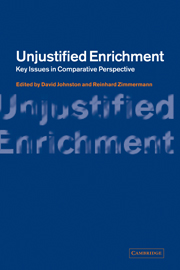Book contents
- Frontmatter
- Contents
- List of contributors
- Preface
- Table of cases
- List of abbreviations
- I Introduction
- II Enrichment ‘without legal ground’ or unjust factor approach
- III Failure of consideration
- IV Duress and fraud
- V Change of position
- VI Illegality
- 10 The role of illegality in the English law of unjust enrichment
- 11 Illegality as defence against unjust enrichment claims
- VII Encroachment and restitution for wrongs
- VIII Improvements
- IX Discharge of another person's debt
- X Third-party enrichment
- XI Proprietary issues
- XII Taxonomy
- Index
10 - The role of illegality in the English law of unjust enrichment
Published online by Cambridge University Press: 31 July 2009
- Frontmatter
- Contents
- List of contributors
- Preface
- Table of cases
- List of abbreviations
- I Introduction
- II Enrichment ‘without legal ground’ or unjust factor approach
- III Failure of consideration
- IV Duress and fraud
- V Change of position
- VI Illegality
- 10 The role of illegality in the English law of unjust enrichment
- 11 Illegality as defence against unjust enrichment claims
- VII Encroachment and restitution for wrongs
- VIII Improvements
- IX Discharge of another person's debt
- X Third-party enrichment
- XI Proprietary issues
- XII Taxonomy
- Index
Summary
Introduction
When English unjust enrichment lawyers talk of ‘illegality’, they generally do so in the context of the unravelling of partly performed illegal contracts. Two parties enter into an illegal contract. What generally happens is that one pays for a service to be performed but fails to receive the agreed exchange. Can that party recover the value he has transferred to the non-performing recipient? The law in this area is complex and difficult to state with any accuracy.
There are a number of reasons why the judges do not find it easy to come to an agreed answer to this problem. The consequence of a finding of illegality in English law is that the contract is null and void. No action may be brought for compensation for non-performance, nor will an order for specific performance be available. With such a harsh attitude taken to contractual performance, the pressure falls entirely on the law of unjust enrichment to sort out the mess. And the difficulties are only exacerbated by the fact that English law adopts an extremely wide view as to what amounts to an illegal contract. Not only does it include contracts to commit crimes, as, for example, a contract to kill or to injure another person, but also contracts of which performance, though not illegal in any criminal sense, will not be enforced for various reasons of public policy.
- Type
- Chapter
- Information
- Unjustified EnrichmentKey Issues in Comparative Perspective, pp. 289 - 309Publisher: Cambridge University PressPrint publication year: 2002
- 1
- Cited by



